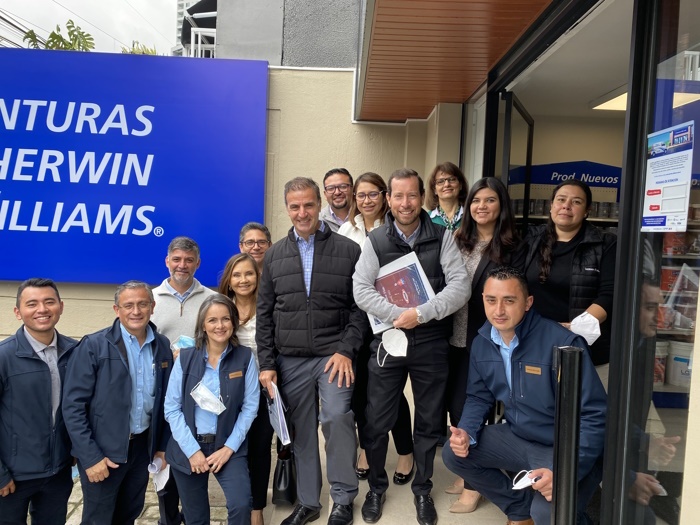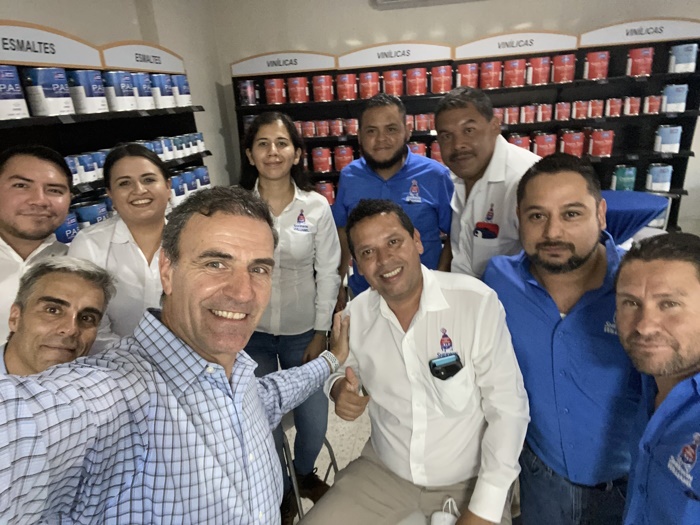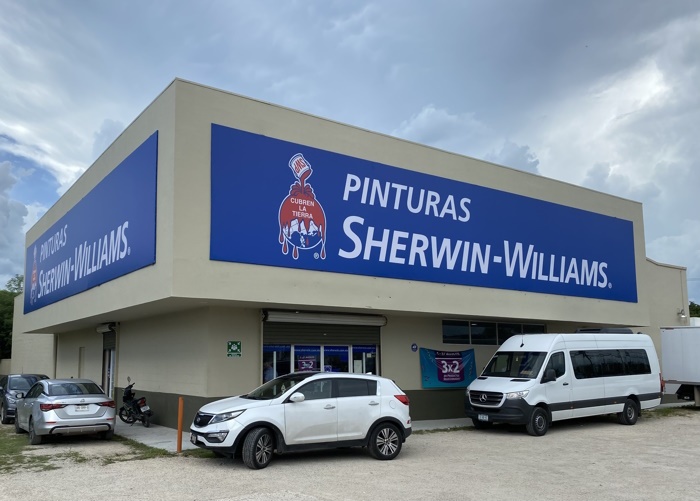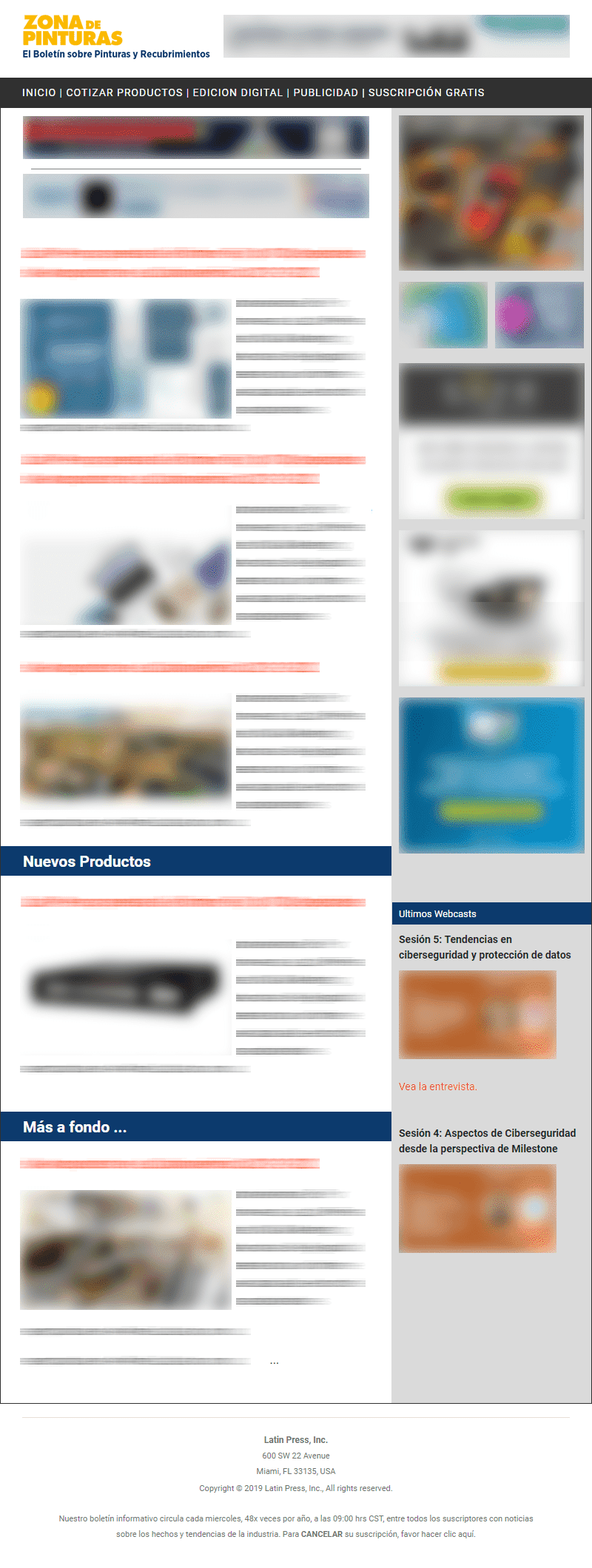The president of Sherwin Williams for Latin America is the first interviewee in a series of conversations with industry leaders to investigate aspects related to global strategies of each company in the region.
By Claudio Fazzone*
Mr. Alberto Benavídez is the President of Sherwin Williams (SW) for Latin America. He started in the company 16 years ago as Sales Director at Sherwin Williams Argentina. He previously worked in multinational companies such as Kodak, NEC and IBM.
SW Latin America spans from Mexico to the south. In total, it has a presence in eight countries in the region where it operates as a manufacturer, distributor and retailer. Its most important plants are located in Brazil, Mexico, Ecuador, Chile and Argentina.
SW does not have a single regional model, but seeks to deepen the arrival to the market by adapting by country according to distribution formats with different channels. In this way, the final consumer, whether a painter, contractor of the industrial or decorative segment and even each homeowner, can access coating solutions.
Claudio Fazzone: the acceleration of changes in recent years has led companies to focus on the incorporation and retention of employees, what aspects have you carried out from Human Resources? What do you consider to be the key aspects to maintain your team of collaborators?
Alberto Benavídez: This is a very important aspect for our company. SW has culturally internalized the respect, diversity and inclusion of all its employees, starting with leaders, who must be intentionally inclined to these values.
In terms of incorporation, development and retention of talent, it is key from the recruitment process, analyzing in detail the profile of the candidate so that this 'cultural fusion' of which we are very proud takes place. Retention and engagement rates at the regional level are among the best globally.
CF: Do you find different needs according to the countries where you have a presence or do you see this as a global phenomenon?
AB: Although there are specific adjustments according to the idiosyncrasies or cultural issues of each country, in essence we honor a model of values that has been internalized in the company in its 156-year history.
CF: Sherwin is in most countries where it has a presence, in addition to being a manufacturer, a retail company. In this business do you see greater difficulties today to be able to retain your staff of collaborators and achieve an efficient recruitment management?
AB: No, quite the opposite. Both in the countries where we have stores, and in those that operate through indirect channels, we have programs that are 'the gateway' of young talents who quickly take more responsibility and develop a successful career. The current CEO of SW started as a young professional assisting in a store.

CF: For some years now we have seen a concentration of paint factories; Multinational companies, like some regional ones, buy their competitors to gain share. How do you see this trend? In the case of SW, and thinking about the Latin American market, you have made the acquisition of Condor in recent years, do you think it is possible to follow this path into the future?
AB: SW has been in Latin America for almost 100 years. Throughout that century, many important companies and brands have joined in different countries. The company has an absolute vocation to grow not only organically, but also through mergers and acquisitions. It is a permanent management the analysis of continuing to grow in this way.
CF: During the pandemic there was an increase in paint consumption in many markets; Consumers with time decided to refurbish their homes, the need was latent. What do you think can happen from now on? Although in number of liters the increase was not so noticeable, but in operations, do you estimate that these levels of activity can be maintained or do you consider a return to pre-pandemic levels?
AB: It is known that the pandemic generated some changes in consumption and developed the "Do it Yourself" segment. These processes have a residual effect that is sure to last. At the same time, the return to the new normal reactivated those segments that were partially halted during the pandemic. In summary, my opinion is that changes in habits in general will increase the consumption of paint, especially in home repainting.

CF: In some Latin American countries, consumption is below average; There are cultural and climatic issues that can favor consumption. Apart from this, do you see possible actions to generate greater paint consumption? Can it be feasible to influence cultural changes that cause this?
AB: Yes, climatic and geographical issues greatly influence decorative and industrial protection paints. For example: coastal cities have a higher painting frequency than others. Also those regions of high rainfall levels.
Culturally it is also common that, in celebrations, consumers seek to beautify their homes, and that generates seasonal peaks of consumption.
There are cities or sectors in which the exterior painting gives it a particular and also distinctive beauty. In this sense, the management of agencies linked to urban development could promote even more.
CF: How does it affect the price elasticity of products? Could having lower-priced offers be a factor in itself that generates greater consumption?
While different economic realities are seen within the region, do you see a trend towards lower-priced products in general or would it be only in a timely manner?
AB: There's a lot of linearity in product segmentation. The price varies depending on the quality in terms of performance, durability and resistance.
The consumption of the different quality segments usually varies depending on the project in which the materials will be applied, both decorative and industrial.
In the case of price elasticity, factors also operate that have to do with brand positioning combined with the available budgets per household and project, which also vary in different countries.

CF: There is a growing concern about caring for the planet. Companies are increasingly required to produce products that do not harm the environment, that can be recycled, that production processes have the necessary safeguards. How are you working on this aspect?
AB: SW is a pioneer in environmental care and sustainability. Not only in the use of materials, but also in an active participation in the treatment of water and energy.
CF: At a massive level, the replacement of water-based paints to the detriment of solvent-based lines has been a contribution to the care of the environment, however in sales they are still, in some places, low volume products. Can aspects such as price, in general more expensive water-based than solvent, have an impact, or do you consider that it is another issue of lack of information?
On the other hand, what activity does SW carry out to optimize the care of the environment? Do you have a defined policy in this regard?
AB: SW is a leader in all countries it operates in promoting the development of water-based paints. Beyond this, in the last decade the company is very focused on producing coatings with zero VOCs and has always continued to lead by example, but supporting all organizations that seek to care for the environment.
SW has a very strong sustainability policy.


























Leave your comment